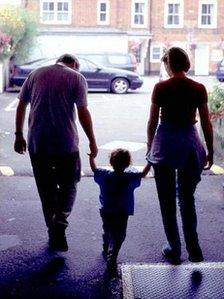Children's charities warn of rise in vulnerable
- Published

Charities fear for future generations if changes are not made soon
The number of children living in vulnerable families could rise to more than one million by 2015, three leading UK charities have warned.
Research for the NSPCC, Action for Children and The Children's Society suggests struggling families will be badly hit by cuts to tax and benefits.
They want urgent action to ensure the next generation of young does not become "victim" of austerity.
Ministers say welfare reform will lift thousands of families out of poverty.
The report by Landman Economics classed about 900,000 children as living in vulnerable households in 2008.
This was using a more generous measure than the government's own classification of vulnerable families.
Using that wider measure it predicts the number could increase to more than a million by 2011.
Researchers found a large number of families struggling with multiple problems like unemployment, depression and poor quality housing.
The study also estimated the number of youngsters living in "extremely vulnerable families" could almost double, from less than 50,000 now to 96,000 by 2015.
Cuts to benefits and public services, and the recession, have been blamed for the potential rises.
Dame Clare Tickell, Action for Children's chief executive, said young people are "the innocent victims" of austerity measures.
"Much more needs to be done to protect them. Through our own services we are already seeing first-hand the damaging effects taking their toll."
'Reverse this trend'
The trio of charities want an assessment of how further spending cuts, tax and benefit reform could impact on the next generation.
NSPCC chief executive Andrew Flanagan said: "It seems the most vulnerable children are bearing the brunt. This will make the job of turning their lives around even harder.
Children's Society chief executive Matthew Reed warned: "Too many... go to school hungry, have no permanent home or proper shoes.
"These latest figures make shocking reading and must act as a wake-up call to those with the power to reverse this trend."
But ministers have rejected the criticism, saying the new system of Universal Credit will lift 350,000 children and 550,000 adults out of poverty.
A Department for Work and Pensions spokesman said: "Only by reforming the welfare system and breaking the cycle of worklessness and dependency will we improve the lives of some of the poorest families in our communities."
A family is deemed "vulnerable" if it meets four or more of the government's own criteria for vulnerability - these include unemployment, overcrowded housing or having a parent with mental health problems.
Labour's Shadow Minister for Children and Families Sharon Hodgeson said: "This report from well-respected children's charities paints a grim picture of the kind of future that this government is creating for children and young people, cutting both financial support and services like Sure Start that help the families that need it the most.
"Ministers talk tough on troubled families, but this report says that their policies will push more families into that category.
"It also shows that the number of children classed as severely vulnerable will almost double."
- Published13 March 2012
- Published1 March 2012
- Published14 June 2012